Handheld Thermal Imager Market (Defense & Diagnostics Industry) 2022-2031
The global handheld thermal imager market was valued at $3.7 billion in 2021, and is projected to reach $9.1 billion by 2031, growing at a CAGR of 9.9% from 2022 to 2031.
A handheld thermal imager is a portable and contactless device that detects infrared energy (heat emitted by objects) and converts it into a visual image. It consists of a lens, thermal sensor, a mechanical housing, and processing electronics. Some of the important characteristics of thermal imaging cameras are resolution, field of view, range, thermal sensitivity, focus, and spectral range. These characteristics are crucial while selecting a particular thermal imager for any application. Originally, thermal imaging system was developed for surveillance and military operations, but it is now widely used for diagnostics and maintenance in manufacturing, automotive, and aerospace industry.
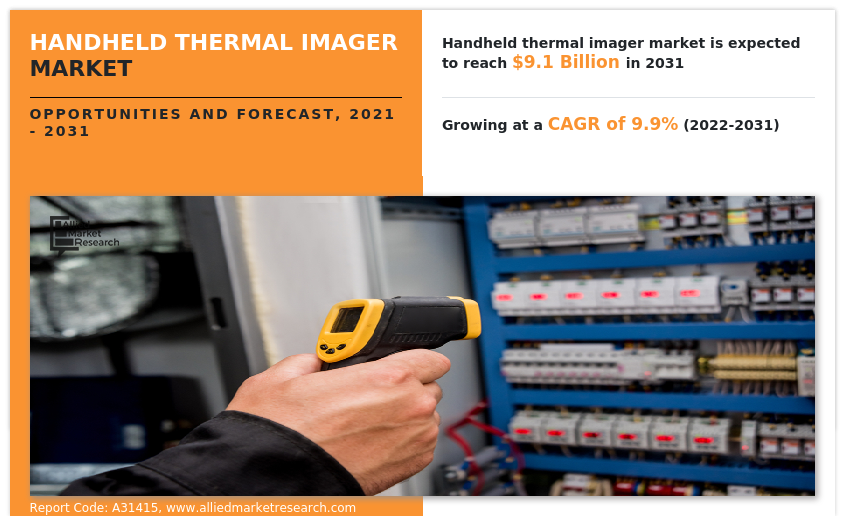
The handheld thermal imager market is segmented into End Use Industry, Product Type, Application and Wavelength Type.
Factors such as increase in adoption of thermal imaging for quality control & inspection, and increase in use of thermal imager for safety & security are anticipated to boost the growth of the global handheld thermal imager market during the forecast period. However, high capital and maintenance cost, and limitation in operating environment are expected to hinder the growth of the global market during the forecast period. Moreover, increase in use of thermal camera for diagnostics and maintenance, and rise in defense expenditure globally are expected to create an opportunity for the handheld thermal imager industry in near future.
Handheld thermal imager market is segmented on the basis of end use industry, product type, application, wavelength type and region. By end use industry, it is divided into defense, public safety, industrial, and others. By product type, it is divided into cooled thermal imager, and uncooled thermal imager. By application, it is segmented into security and surveillance, monitoring and inspection, and detection and measurement. By wavelength type, it is divided into LWIR, MWIR, and SWIR. By region, the market is analyzed across North America, Europe, Asia-Pacific and LAMEA.
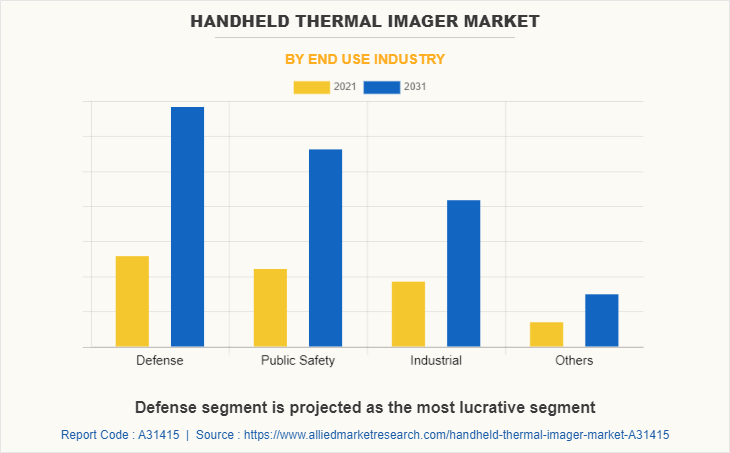
The key players that operate in this handheld thermal imager market are American Technologies Network Corporation, Axis Communications AB, BAE Systems Plc., Elbit Systems Ltd., Fluke Corporation, L3Harris Technologies, Inc., Leonardo S.p.A., Opgal Optronic Industries Ltd., Raytheon Technologies Corporation, Safran S.A., Seek Thermal Inc., Teledyne FLIR LLC, Testo SE & Co. KGaA, Thales Group, and Thermoteknix Systems Ltd.
Increase in adoption of thermal imaging for quality control & inspection
Thermal imaging is gaining traction in industrial and manufacturing sector for their usage in quality assurance monitoring and process control. Process control assures data on temperature measurement and determines the shape of a product on a production line. The acquired data is used to control and improve the process so that the temperature and product shapes are according to the specification. Thermal imagery in production line provides enhanced information to product specialists.
For instance, thermal imaging is used to monitor manufacturing production line. Heat treatment is used in metal manufacturing to alter its chemical and physical properties. These cameras are used to monitor the temperature of metal parts. In addition, many automobile manufacturers are using thermal cameras for quality control. End uses in automobile manufacturing include inspection of rear window heating, heated seats, and air conditioning outlets. Furthermore, thermal cameras are used for quality control & inspection in semiconductor manufacturing to detect hot spots, which are indicative of defective products. All these factors enable the usage of thermal imaging cameras in quality control & inspection under manufacturing sector, thereby boosting the demand for handheld thermal imager market during the forecast period.
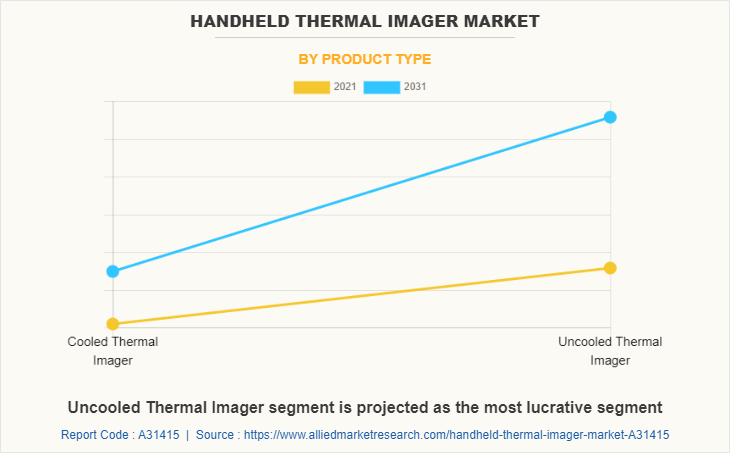
Increase in use of thermal imager for safety and security
Public safety is the topmost priority across the world. Public safety agencies are investing in numerous new technologies to ensure efficiency. With surge in crime rates, antisocial behavior, and terrorist attacks, governments of various countries have adopted new technologies and strategies to ensure public safety and security. It has become necessary to improve the system and responses for catastrophic attacks and to find safe, cost-effective, and feasible solutions. Various thermal imaging cameras are being adopted for surveillance in defense, homeland security, perimeter surveillance, and enforcement fields. Handheld thermal imagers provides clear images in total darkness owing to this it’s getting widely used for search and rescue operation, firefighting, and law enforcement. Enhanced features such as excellent performance, superior imaging capabilities, and high reliability on the fields is driving the growth of the handheld thermal imager market.
Limitation in operating environment
Thermal imagers measure the amount of thermal energy emitted by the human body, an animal, or any structure. The camera generates heat patterns and an image from them, which aids in the investigation of faults, threats, or other possibilities. Thermal imaging system does not work through glass or water because glass transmits visible light but acts as a mirror for thermal wavelengths. When a thermal camera is held in front of the glass, an image of the person holding the thermal camera is produced. The resulting image will be blurry and lack substantial detail and contrast. Moreover, water acts as a barrier for thermal wavelength. Water has a higher heat capacity than air, requiring four times the energy to raise or lower the temperature of an equivalent volume by one degree. This means the objects lose or gain their heat energy faster in comparison to water over shorter distances. Hence, it becomes difficult for the thermal imager to differentiate objects underwater.
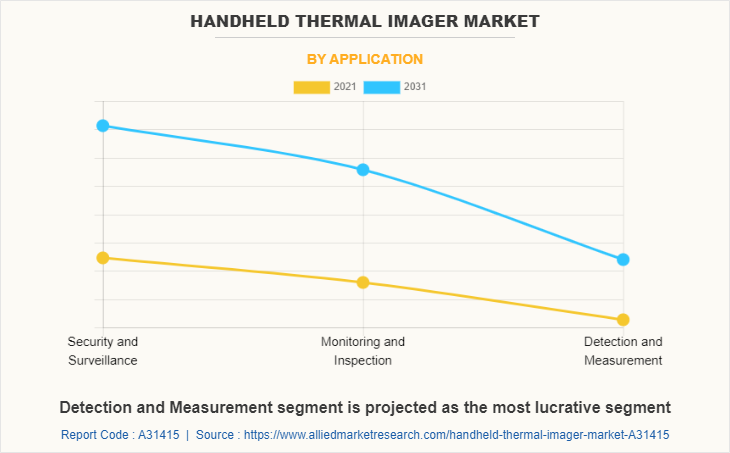
Increase in use of thermal camera for diagnostics and maintenance
Thermal camera is highly preferred for preventive maintenance in various fields such as manufacturing, oil & gas, and energy & power. These cameras detect hot spots or rise in temperature, which represents high probability of faults or failures of the objects. The use of thermal cameras is a safe and effective method of maintenance, especially for equipment operating at extremely high temperatures such as boilers, heat exchangers, and furnaces. As these cameras could be installed near an equipment, the equipment is hence monitored while operating. Thermal imaging has proven to be an effective, non-invasive method of inspection and evaluation for vehicle components. By using infrared light to measure variations in temperature, these devices allow technicians to immediately determine if further work needs to be conducted—ultimately speeding up the repair process. Thermal imaging cameras can be used for repair, maintenance and diagnostics of various components and applications such as hot spots in electrical circuits, battery and connections, HVAC systems, leaking problems, relays, switches and sensors, tires and brakes, power train parts, gearbox and transmission systems, exhaust and tail gas systems in automotive and aviation sector of . Consequently, regular preventive maintenance using thermal imaging cameras reduces downtime, production losses, power outages, and fires, thereby helping to save considerable cost. Thus, increase in adoption of thermal imaging cameras for cost-effective diagnostics and preventive maintenance for various industries significantly contributes toward the handheld thermal imager market growth.
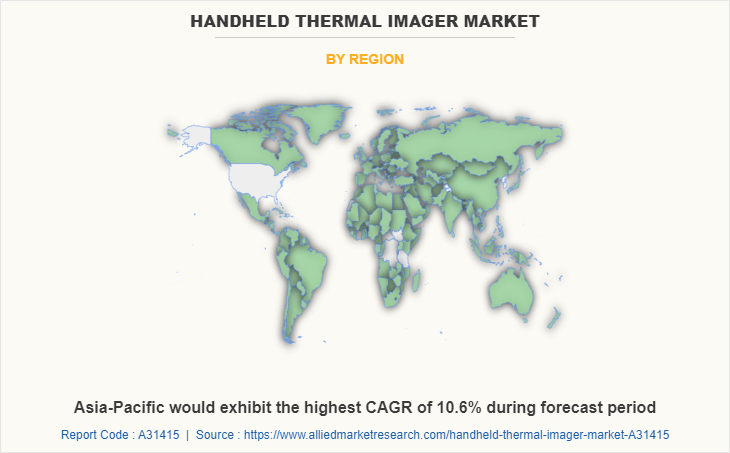
Key Benefits For Stakeholders
- This report provides a quantitative analysis of the market segments, current trends, estimations, and dynamics of the handheld thermal imager market analysis from 2021 to 2031 to identify the prevailing handheld thermal imager market opportunities.
- The market research is offered along with information related to key drivers, restraints, and opportunities.
- Porter's five forces analysis highlights the potency of buyers and suppliers to enable stakeholders make profit-oriented business decisions and strengthen their supplier-buyer network.
- In-depth analysis of the handheld thermal imager market segmentation assists to determine the prevailing market opportunities.
- Major countries in each region are mapped according to their revenue contribution to the global market.
- Market player positioning facilitates benchmarking and provides a clear understanding of the present position of the market players.
- The report includes the analysis of the regional as well as global handheld thermal imager market trends, key players, market segments, application areas, and market growth strategies.
Handheld Thermal Imager Market Report Highlights
| Aspects | Details |
| Market Size By 2031 | USD 9.1 billion |
| Growth Rate | CAGR of 9.9% |
| Forecast period | 2021 - 2031 |
| Report Pages | 335 |
| By End Use Industry |
|
| By Product Type |
|
| By Application |
|
| By Wavelength Type |
|
| By Region |
|
| Key Market Players | Safran Electronics and Defense, Elbit Systems Ltd, American Technologies Network Corporation, United Technologies, Axis Communications, BAE Systems, Seek Thermal Inc, Fluke Corporation, FLIR Systems, Leonardo, Thales group, Opgal, L3HARRIS TECHNOLOGIES, Testo, Thermoteknix Systems Ltd |
Analyst Review
The handheld thermal imager market is expected to witness significant growth, due to owing surge in demand for thermal cameras with the outbreak of COVID-19 pandemic. The sudden outbreak of the COVID-19 pandemic has enforced industries to adopt advanced safety and health protection measures. Thermal imaging is a preferred as a cost-effective measure to safeguard workplace safety and inhibit further spreading of the virus. Moreover, increase in demand from automotive sector for vehicle diagnostics and maintenance is expected to fuel the growth of the handheld thermal imager market.
Factors such as increase in adoption of thermal imaging for quality control & inspection, and rise in use of thermal imager for safety & security are anticipated to boost the growth of the global handheld thermal imager market during the forecast period. However, high capital and maintenance cost, and limitation in operating environment are expected to hinder the growth of the global handheld thermal imager market during the forecast period. Moreover, increase in use of thermal camera for diagnostics and maintenance, and rise in defense expenditure globally is expected to create an opportunity for the handheld thermal imager market in near future.
To fulfil the changing demand scenarios, market participants are concentrating on product launch and product developments to offer a diverse range of products and meet new business opportunities. For instance, in June 2022, Teledyne FLIR LLC launched an E52 camera to its range of Exx thermal Imaging devices which currently include the E96, E86, E76 and E54 models. The new E52 camera offers professional quality thermal resolution to ensure that images are easy to read easy-to-read and on-camera routing capability to improve field survey efficiency. Moreover, in October 2020, BAE Systems Plc launched its full high-definition thermal camera core, Athena 1920, which combines exceptional infrared image clarity with a wide field of view. The compact, light, and low-power thermal camera core delivers superior imagery and uncompromising performance, and is ideal for long-range and demanding applications, including security, surveillance, and targeting systems. In addition, market participants are continuously focusing on business expansion efforts to expand their geographic presence and meet new business opportunities. For instance, in April 2021, Elbit Systems Ltd. announced that its U.S. subsidiary, Elbit Systems of America LLC, (“Elbit Systems of America”), signed a contract to delivery order valued at approximately $41 million for the supply of night vision systems and various spare components to the U.S. Marine Corps.
The key players that operate in this market are American Technologies Network Corporation, Axis Communications AB, BAE Systems Plc., Elbit Systems Ltd., Fluke Corporation, L3Harris Technologies, Inc., Leonardo S.p.A., Opgal Optronic Industries Ltd., Raytheon Technologies Corporation, Safran S.A., Seek Thermal Inc., Teledyne FLIR LLC, Testo SE & Co. KGaA, Thales Group, and Thermoteknix Systems Ltd.
The global handheld thermal imager market was valued at $3.7 billion in 2021, and is projected to reach $9.1 billion by 2031, registering a CAGR of 9.9%.
Increase in use of thermal imager for safety and security and increase in use of thermal camera for diagnostics and maintenance are the upcoming trends of handheld thermal imager market.
Security and Surveillance is the leading application of handheld thermal imager market.
Asia-Pacific is the largest regional market for handheld thermal imager.
The key players that operate in this handheld thermal imager market are American Technologies Network Corporation, Axis Communications AB, BAE Systems Plc., Elbit Systems Ltd., Fluke Corporation, L3Harris Technologies, Inc., Leonardo S.p.A., Opgal Optronic Industries Ltd., Raytheon Technologies Corporation, Safran S.A., Seek Thermal Inc., Teledyne FLIR LLC, Testo SE & Co. KGaA, Thales Group, and Thermoteknix Systems Ltd..
Loading Table Of Content...



